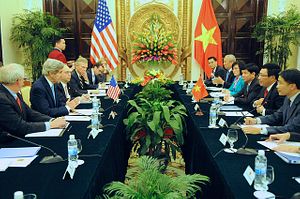People who doubt that bitter foes can become good friends should look at the United States and Vietnam.
When I served on Vietnam’s delegation to the United Nations, from 1987 through 1990, I found most Americans warm and friendly, even though many Americans, understandably, could not look beyond the legacy of war.
But, in 1995, the U.S. and Vietnam established diplomatic relations. Now, as the Ambassador of Vietnam to the U.S., I find Americans focused on the future and what we can accomplish together, from creating jobs through trade to building mutual understanding through education.
As for the Vietnamese – a youthful people whose median age is under 30 – we are also eager to move ahead. During a 1,200-mile bicycle ride across our country in the late 1990s, Ted Osius, now U.S. Ambassador to Vietnam, feared that he might encounter hostility upon arrival at an old demilitarized zone. Instead, he was welcomed by a woman who told him, “We are now brothers and sisters.”
When I recently presented my credentials to President Obama, I thought about the path our countries have traveled from conflict to cooperation.
After decades of efforts, Presidents Barack Obama and Truong Tan Sang launched an initiative called the U.S.-Vietnam Comprehensive Partnership in July 2013 to guide the continuing transformation of relations between our peoples. Reflecting the reconciliation, this partnership is supported by visionary veterans, including Secretary of State John Kerry and Senator John McCain. As Secretary Kerry observed in December 2013, “no two countries have worked harder, done more and done better” to overcome the past and work for the future.
As Americans and Vietnamese prepare to celebrate the 20th anniversary of normal diplomatic relations this July, now is the time to broaden and deepen our friendship, trust and collaboration. Through the Comprehensive Partnership, our countries can chart the course for decades to come and expand our cooperation in a broad range of areas including economy and trade, security and defense, healthcare and humanitarian assistance, education and the environment. And we can help advance normalization by removing outmoded obstacles, such as the arms embargo.
After three decades of renovation, Vietnam’s market-based reforms have been deepened, spreading prosperity to our people and lifting millions out of poverty. From 2000 through 2014 alone, Vietnam’s Gross Domestic Product per capita – the output per person – rose five-fold from about $400 to almost $2,000.
With this increased consumer demand, Vietnam has become the US’ 26th largest trading partner, with total two-way volume reaching $36 billion in 2014. That was a fourfold increase from 2006, the year before the US restored permanent normal trade status to Vietnam– and a 70-fold increase since 1995, when diplomatic relations began.
The potential remains enormous. Recently, GE sold $1.7 billion worth of engines to Vietnam Airlines, another $800 million worth of engines to VietJet Air (the nation’s first private airline), and $94 million worth of turbines to Cong Ly Wind Farm. Such exports to Vietnam support American businesses and jobs, while helping Vietnam improve its economy and living standards.
In the same vein, the soon-to-be-achieved Trans-Pacific Partnership, including the US, Vietnam and 10 other countries, will transform trade across the Pacific, accelerate Vietnam’s market reforms, and energize each of our economies.
Education and technology, as well as people-to-people exchange are pillars of cooperation. Vietnam now has 16,500 students in the US, first among Southeast Asia countries and eighth across the globe. Two decades ago, a Fulbright Economics Teaching Program was founded in Ho Chi Minh City, thanks in part to then-Senator John Kerry’s tireless efforts.
Now, we are working to establish a Fulbright University. These efforts honor the statesman who was a voice for peace and a mentor to President Clinton, who normalized relations with Vietnam.
Our two countries continue working together on the legacies of war, as well as other issues such as climate change and disaster relief. Vietnam cooperates fully on MIA issues, while the US is helping Vietnam to clean up the Agent Orange herbicides and defoliants, as well as unexploded ordinance.
The two countries have established 11 dialogue mechanisms, including the annual Bilateral Defense Dialogue and Political-Security-Defense Dialogue aimed at expanding our cooperation in maritime security, search and rescue, humanitarian assistance, disaster relief, nuclear nonproliferation and peacekeeping. Our joint efforts received a big boost in 2013, when Secretary Kerry announced $18 million in assistance to enhance Vietnam’s search and rescue, disaster response and other maritime capabilities.
Leaving a legacy of conflict behind, Vietnam and the US now work together in a spirit of shared purpose and interests. As we celebrate 20 years of diplomatic relations, our partnership presents a model for a world weary of war and craving collaboration for the welfare of all.
Pham Quang Vinh is the new Ambassador of Vietnam to the United States.

































